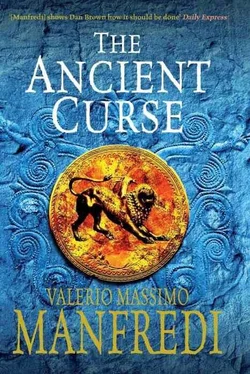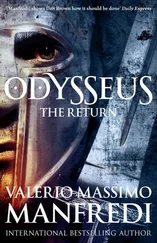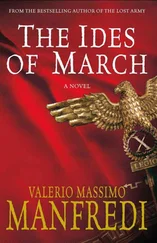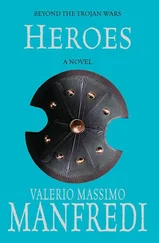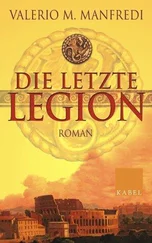‘If it happens to be one o’clock in the morning?’
‘Why not? I always work until late. You won’t be disturbing me at all.’
He scribbled his number on a paper napkin and handed it to Pina, who deposited it between her breasts.
‘And what about this other business of the murders?’ she said in a low voice and with a hint of complicity. ‘Have you heard about them?’
‘Murders? What murders?’ asked Fabrizio, feigning ignorance.
‘Goodness, you don’t know? The tomb robbers they found butchered in the fields near Contrada Rovaio and in the Gaggera bush. Everyone in town knows about these murders and you know nothing? I thought you were on top of things over at the Antiquities Service.’
‘I’m not with the Antiquities Service, Signora Pina, and I haven’t heard about any murders. Are you sure? It’s not just gossip?’
‘Gossip! Around here people know who has a cold and who doesn’t. These men were found with their throats cut. Or worse. I’ve heard things that would make your skin crawl. Well, whoever it is, they’re certainly doing you people a favour – it’ll be a while before anyone dares to roam the countryside with a drill looking for tombs. No one wants to end up the way they did.’
‘Don’t believe everything you hear, Signora Pina. It will just ruin your day. In any case, you’re in no danger, are you? You’re a cook, not a tomb robber. By the way, how much is it for lunch? And remember, if you see anything…’
‘Don’t worry,’ replied Pina, ‘I’ll let you know immediately. That’s eight fifty for everything, Doctor. I always give you a good deal.’
Fabrizio paid the bill and went to where he had parked his car. He decided to drive home. No one seemed to be following him; maybe Reggiani had ordered protection for him only at night.
Fabrizio pulled up in front of the farmhouse but didn’t go in; he didn’t feel like going straight back to work. He couldn’t shake off a strange sensation. He’d been living in an unreal atmosphere for days and he continually felt tempted to leave and forget about everything, find a new line of work completely. Why not? He kept experiencing little twinges of regret over Elisa, the girl who had left him and obviously hadn’t missed him at all, seeing that she’d never called once. He felt attracted to Francesca but wasn’t head over heels, wasn’t on fire like he’d hoped, wanted, yearned to be. Underneath it all was this annoying sensation of melancholy and depression. Basically, he felt alone and didn’t expect that this would change any time soon.
It was even stranger that he should be caught up in such superficial thoughts after what he’d seen the night before. Perhaps it was a natural reaction, he told himself, a defence mechanism to head off the stress before it became overwhelming. He raised his eyes to the dense grey sky that couldn’t decide whether to let through a ray of sun or dump a bucket of rain, then walked down the lane to the point where he had heard the beast prowling, hunting him down, the night before.
It seemed like all that had happened a century ago. Everything was peace and tranquillity now, and each time he took in a little bit of the scene he felt that he was snapping a photograph. Another strange sensation he couldn’t explain. He walked along the stream to the road to look at the spot where the animal had laid into that poor wretch. There were still brownish stains on the asphalt, broken branches on both sides of the road and a strange odour in the heavy air, or maybe he was imagining it. He felt relaxed now, surrounded by green foliage and silence.
He returned to his car parked in the courtyard, took the briefcase with the books he’d borrowed from the library from the passenger’s seat, went into the house and immersed himself in his studies.
When he started getting a bit tired, he stood up to stretch his legs and saw that it was already late in the afternoon. He remembered the messages he’d picked up before leaving the office and went to see if there was anything from Francesca. At the bottom of the pile was a sealed envelope, which he opened. All it contained was a typed address.
He was upset, but oddly not surprised, and realized it could be only one thing. In his mind he could hear the voice on the telephone. He took the topographical map he was using for his work, a military 1:25,000 chart, and identified the locality, a place he was not familiar with. Then he got into his car and set off. After a time on the regional road, he turned off into the countryside, driving along a dusty track. Every now and then he’d turn on his wipers, but there was less rain hitting the windscreen than dust in the air and the end result was a series of long reddish, semicircular streaks on the glass that prevented him from seeing out. Unfortunately there was no cleaning fluid because he’d forgotten to replace it. He had a feeling that he was being followed, but it was impossible to be sure.
He could feel his heartbeat quicken as he neared the place he’d circled on the map. When he spotted it in the distance, a kind of renovated farmhouse with a yellow neon sign in the window, he had to stop for a moment to catch his breath and calm down. Thousands of thoughts went through his mind, including either calling Reggiani or turning back entirely. But then he reasoned that all he had to go on was an address in an envelope: it could be anything at all, or maybe even a mistake. After all, it was only a tavern or a cafe; a bed and breakfast or something of the sort.
He parked on the left, joining three or four other vehicles of various types and a couple of old bicycles. He got out of the car and walked towards the entrance, but all at once heard a rustling noise coming from a hedge of laurel bushes behind the building. He wheeled around, feeling jumpy, and caught a quick glimpse of a little seven- or eight-year-old boy with short, fine hair gathered in clumps on his forehead who seemed to be watching him from behind the corner of the house. He looked remarkably like the boy he’d seen slipping behind the door at the Caretti-Riccardi palace in town. Fabrizio tried to call out to him, but he was gone in a flash.
Music wafted out of the tavern, an instrumental melody with flutes and kettledrums that blended with the low buzz of people chatting. Fabrizio went in and found himself in a big room with an uneven terracotta floor and plastered walls decorated with improbable frescoes of pseudo-Etruscan inspiration. An even less probable dancer in an Etruscan-style outfit was weaving between the tables to the notes of the New Age music. There weren’t many guests, perhaps a dozen or so, all dressed on the shabby side. They looked mostly like the English or German couples who rented the farmhouses dotting the countryside. The scene was so trite and so dreary that the overall effect was unsettling.
He turned towards the bar, a Formica faux-wood counter covered with a pane of glass that had long since lost any transparency. Behind the counter was a woman of forty or fifty who was still attractive, although her get-up was so bizarre it was difficult to say for sure. Heavy necklaces and long earrings dangled at her neck and ears. Her hair was dyed a deep black, but the intense, magnetic look of her eyes and the marked wrinkles at the sides of her mouth gave her a harsh, almost bitter expression. Fabrizio wondered how the customers could seem so much at ease with this harpy behind the counter.
In the few moments that had passed since he entered, Fabrizio had regained control of his emotions as he realized that the tavern, albeit grotesque, inspired a certain sense of calm and security, although he felt out of place among the regulars. He approached the counter, drew up a stool and asked for a glass of white wine.
The woman stared straight into his eyes as she poured. ‘I didn’t think you’d come,’ she said. ‘You look like a nice boy. I’m sorry you’ve got yourself into such a mess… You risk meeting a nasty end, you know that, don’t you?’
Читать дальше
